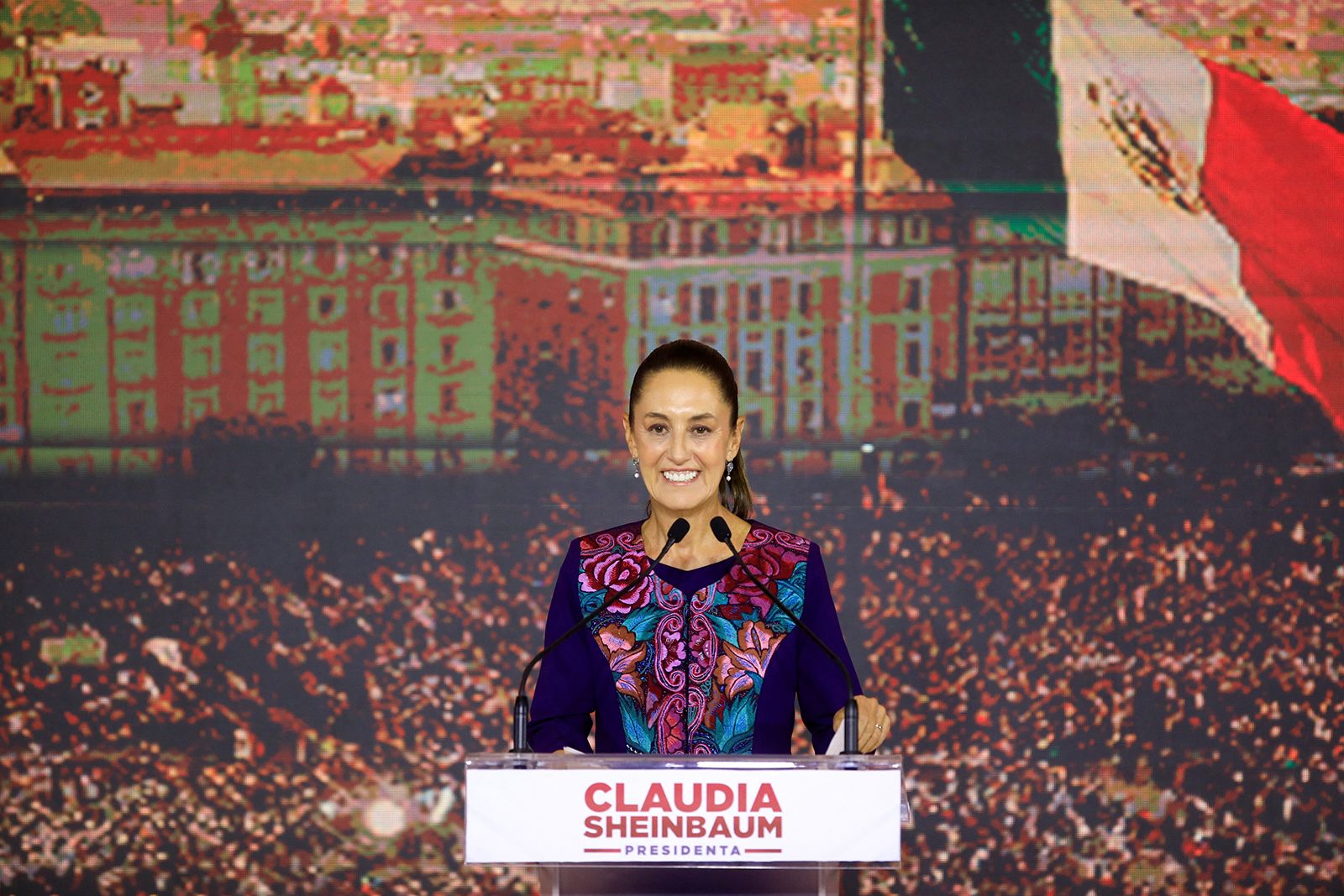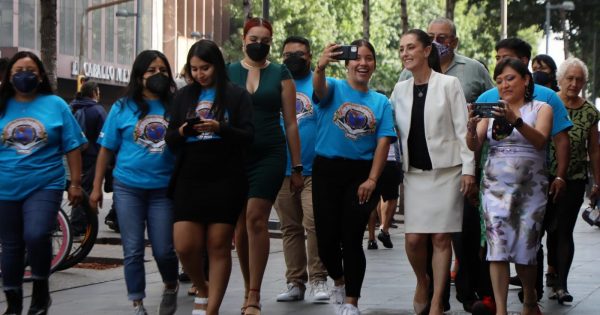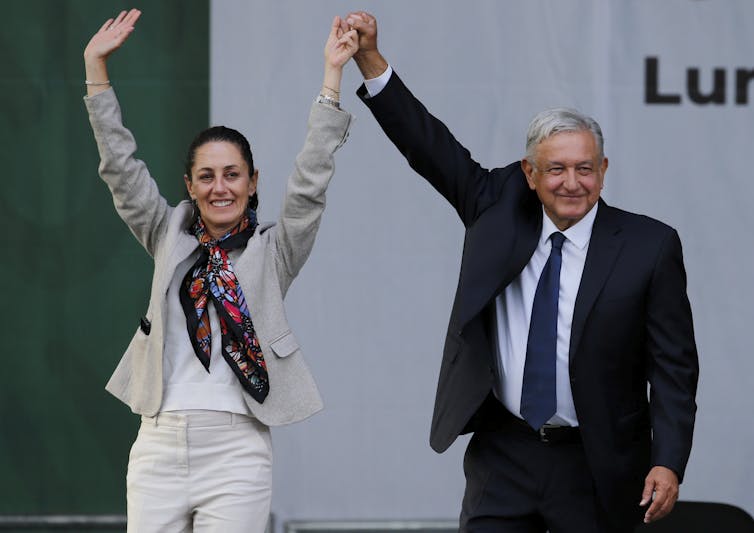Claudia Sheinbaum Mexico’s 1st Female President: Her Remarkable Journey and Early Life
Claudia Sheinbaum Mexico has become a transformative figure in Mexican politics, blending her scientific expertise with a progressive vision for the nation. As the first woman elected President of Mexico, her path from academia to the pinnacle of political power is a story of dedication, resilience, and groundbreaking achievements. This comprehensive article explores her life, career, and lasting impact on Mexico.
Early Life and Education
Childhood and Family Background
Claudia Sheinbaum Pardo was born on June 24, 1962, in Mexico City, into a family deeply rooted in academia and science. Her father, Carlos Sheinbaum, was a chemical engineer, and her mother, Annie Pardo, was a biologist. This intellectual environment fostered her early interest in science and set the stage for her future academic and professional endeavors.
Growing up in a secular Jewish family, Claudia Sheinbaum Mexico experienced a blend of cultural and intellectual influences. Her paternal Ashkenazi grandparents emigrated from Lithuania to Mexico City in the 1920s, while her maternal Sephardic grandparents moved from Sofia, Bulgaria, in the early 1940s to escape the Holocaust. This diverse heritage enriched Claudia’s upbringing, providing her with a unique perspective on social justice and human rights.
Academic Pursuits
Claudia Sheinbaum Mexico academic journey is distinguished by her dedication to environmental science and engineering. She attended the National Autonomous University of Mexico (UNAM), where she earned her bachelor’s degree in Physics. She continued her studies at UNAM, obtaining a master’s degree in Energy Engineering and later a Ph.D. in Environmental Engineering.
Her academic excellence was evident early on. As an undergraduate, Sheinbaum was recognized for her outstanding performance, receiving various scholarships and awards. Her master’s thesis focused on energy conservation and efficiency, topics that would later become central to her career in environmental policy.
Early Career and Research
Before entering politics, Claudia Sheinbaum Mexico made significant contributions to environmental science. She worked at the Institute of Engineering at UNAM, focusing on energy efficiency and environmental sustainability. Her research was both theoretical and practical, addressing real-world issues and laying the groundwork for her future policy initiatives.
At the Lawrence Berkeley National Laboratory in California, Claudia Sheinbaum Mexico analyzed energy use in the Mexican transportation sector and published studies on trends in building energy consumption. Her work at Berkeley expanded her understanding of global energy challenges and reinforced her commitment to finding sustainable solutions.
Transition to Politics
Entry into Public Service
Claudia Sheinbaum Mexico transition from academia to politics was motivated by a desire to implement broader societal changes. She began her political career in the early 2000s, joining the Party of the Democratic Revolution (PRD). Her expertise in environmental science quickly made her an essential figure in public service.
Claudia Sheinbaum Mexico’s early political activities included active participation in the Consejo Estudiantil Universitario (University Student Council) at UNAM, which later became the youth movement of the PRD. Her involvement in student politics honed her leadership skills and deepened her commitment to social and environmental causes.
Key Roles and Responsibilities
Claudia Sheinbaum Mexico’s first major political role was as the Secretary of the Environment for Mexico City from 2000 to 2006. In this position, she implemented policies to reduce air pollution and improve public transportation. One of her notable achievements was the introduction of the Metrobus system, which has become integral to the city’s public transport network.
During her tenure, Claudia Sheinbaum Mexico oversaw the construction of an electronic vehicle-registration center and the implementation of various energy-saving initiatives. Her efforts significantly improved Mexico City’s air quality and earned her recognition as a leading advocate for sustainable urban development.
Mayorship of Mexico City
Historic Election Campaign
In 2018, Claudia Sheinbaum Mexico made history by becoming the first woman elected as Mayor of Mexico City. Her campaign centered on tackling the city’s critical issues, such as crime, transportation, and environmental sustainability. Running as a candidate for the National Regeneration Movement (MORENA), she garnered widespread support.
Her campaign emphasized transparency, accountability, and community involvement. Sheinbaum promised to hold regular public hearings and publish crime statistics to increase government transparency. She also committed to creating one million jobs and maintaining universal pensions for seniors, addressing both economic and social concerns.
Progressive Policies and Initiatives
As mayor, Claudia Sheinbaum Mexico implemented a range of progressive policies aimed at enhancing the quality of life in Mexico City. Key initiatives included:
- Public Safety: Increasing the number of police officers and improving their training, along with investing in technology to monitor and respond to crime more effectively. She also promoted community policing strategies to foster trust between law enforcement and residents.
- Environmental Sustainability: Expanding bike lanes, increasing green spaces, and implementing measures to reduce air pollution. She introduced programs to promote recycling and reduce single-use plastics, furthering her commitment to environmental conservation.
- Transportation Improvements: Modernizing the subway system and expanding the Metrobus network. She also launched the Cablebús, an innovative cable car system aimed at reducing traffic congestion and improving access to remote areas.
Challenges and Controversies
Despite her successes, Claudia Sheinbaum Mexico faced several challenges during her tenure. Criticisms included her handling of the COVID-19 pandemic and budget management. However, she consistently addressed these issues with resilience and a commitment to transparency.
The collapse of Line 12 of the Mexico City Metro in 2021 was a significant controversy during her term. While Sheinbaum took immediate steps to address the disaster, including initiating a thorough investigation and implementing safety upgrades, the incident highlighted the ongoing challenges in maintaining and modernizing the city’s infrastructure.
Personal Life and Interests
Claudia Sheinbaum’s Family Life
Claudia Sheinbaum’s family life is an integral part of her identity. She has a daughter, Mariana, from her previous marriage to Carlos Ímaz Gispert. Despite her demanding career, Sheinbaum has always prioritized her family and maintained a close relationship with her daughter.
In 2023, Sheinbaum married Jesús María Tarriba, a financial risk analyst. Their partnership is based on mutual respect and shared values, providing her with strong personal support as she navigates the challenges of political leadership.
Claudia Sheinbaum’s Religion
Raised in a secular Jewish household, Claudia Sheinbaum’s cultural background has played a significant role in shaping her values and worldview. Her family’s history of immigration and perseverance has instilled in her a deep sense of social justice and empathy for marginalized communities.
While Sheinbaum does not frequently discuss her religion publicly, her heritage is an essential aspect of her identity. She celebrates major Jewish holidays with her family and acknowledges the cultural and historical significance of her Jewish background.
Claudia Sheinbaum’s Net Worth
Claudia Sheinbaum’s net worth has been a topic of public interest. While exact figures are not disclosed, her financial status reflects her extensive career in academia and politics. Her modest lifestyle underscores her commitment to public service over personal wealth.
Hobbies and Interests
Despite her busy schedule, Claudia Sheinbaum makes time for her hobbies and personal interests. She enjoys reading, particularly books on history and science, and often spends her leisure time hiking and exploring nature. These activities provide her with a sense of balance and relaxation amidst her demanding responsibilities.
Personal Stats Table
Personal Detail | Information |
|---|---|
| Full Name | Claudia Sheinbaum Pardo |
| Date of Birth | June 24, 1962 |
| Age | 61 years old (as of 2024) |
| Birthplace | Mexico City, Mexico |
| Political Party | National Regeneration Movement (MORENA) |
| Previous Political Affiliation | Party of the Democratic Revolution (PRD) |
| Spouses | Carlos Ímaz Gispert (1987-2016), Jesús María Tarriba (2023-) |
| Children | 1 Daughter (Mariana) |
| Parents | Carlos Sheinbaum (father), Annie Pardo (mother) |
| Education | National Autonomous University of Mexico (BS, MS, PhD) |
| Fields of Study | Energy conservation, energy policy, sustainable development |
| Religious Background | Secular Jewish |
Contributions and Legacy
Environmental Advocacy
Claudia Sheinbaum Mexico’s work in environmental advocacy is one of her most enduring legacies. Her policies have not only improved life in Mexico City but have also set a precedent for other Latin American cities. She has demonstrated that urban development and environmental sustainability can coexist.
Her leadership in creating community ecological reserves and promoting clean energy has made significant strides in Mexico City’s environmental landscape. Sheinbaum’s initiatives have resulted in reduced air pollution levels and increased green spaces, providing residents with a healthier and more sustainable living environment.
Women’s Empowerment
As the first woman elected to lead Mexico City, Sheinbaum has been a trailblazer for women in politics. Her success has inspired many young women to pursue careers in public service, breaking down gender barriers and promoting greater equality.
Sheinbaum’s administration has implemented various programs to support women’s rights and gender equality. She has championed policies to protect women from violence, improve healthcare access, and promote economic opportunities for women. Her efforts have created a more inclusive and equitable society in Mexico City.
Public Service and Governance
Throughout her career, Sheinbaum has maintained a steadfast commitment to public service. Her governance style is characterized by transparency, accountability, and a focus on public welfare. She has consistently prioritized policies benefiting the majority, especially marginalized communities.
Her administration’s education policy, which includes scholarships for students and the establishment of community centers in marginalized neighborhoods, reflects her dedication to social equity. Sheinbaum’s approach to governance emphasizes the importance of addressing the needs of all citizens, particularly those who have been historically underserved.
Claudia Sheinbaum Mexico Presidential Candidacy and Election
Path to the Presidency
Claudia Sheinbaum’s journey to the presidency began with her resignation as Mayor of Mexico City in June 2023 to pursue the presidential nomination for MORENA. She secured the party’s nomination in September 2023, defeating her closest rival, former Foreign Secretary Marcelo Ebrard.
Her campaign for the presidency was built on her proven track record as a leader and her vision for Mexico’s future. Sheinbaum’s platform focused on continuing the progressive policies of President Andrés Manuel López Obrador, emphasizing social justice, economic equality, and environmental sustainability.
Historic Election Victory
In June 2024, Claudia Sheinbaum won the Mexican general election in a landslide, making her the first female president of Mexico and the first president from a predominantly Jewish background. Her victory marked a significant milestone in Mexico’s political history, reflecting her widespread support and the trust placed in her leadership.
Sheinbaum’s electoral success was driven by her ability to connect with voters on key issues such as poverty alleviation, healthcare, education, and environmental protection. Her campaign resonated with a broad coalition of supporters, including young people, women, and marginalized communities, who saw in her a leader capable of addressing their concerns and aspirations.
Vision for Mexico
Continued Advocacy and Leadership
As president, Claudia Sheinbaum is expected to continue advocating for environmental sustainability, social justice, and economic equality. Her presidency aims to build on the progressive policies initiated during her tenure as Mayor of Mexico City, with a focus on nationwide implementation.
Sheinbaum’s vision for Mexico includes ambitious plans to reduce greenhouse gas emissions, promote renewable energy, and enhance public transportation. She also aims to expand social welfare programs, improve healthcare access, and ensure quality education for all.
Future Prospects
Claudia Sheinbaum’s presidency heralds a new era for Mexico, with expectations of significant reforms in various sectors, including education, healthcare, and environmental policy. Her leadership is poised to address the nation’s most pressing challenges and steer Mexico toward a more sustainable and equitable future.
Her administration is expected to prioritize policies that promote inclusive economic growth, reduce inequality, and protect the environment. By leveraging her scientific expertise and political acumen, Sheinbaum aims to implement innovative solutions that benefit all Mexicans.
Achievements and Recognitions
International Recognition
Claudia Sheinbaum’s work has garnered international recognition, including her contributions to the Intergovernmental Panel on Climate Change (IPCC), which was awarded the Nobel Peace Prize in 2007. Her role as a lead author on the IPCC’s Fifth Assessment Report highlights her expertise in environmental policy and her commitment to addressing global climate change.
Claudia Sheinbaum Mexico has also been recognized by various organizations for her leadership in sustainable development. In 2018, she was named one of the BBC’s 100 Women, celebrating her impact on the global stage and her dedication to creating a more sustainable and equitable world.
Domestic Awards and Honors
In Mexico, Claudia Sheinbaum Mexico has received numerous awards for her contributions to science and public service. Her academic achievements, including the Best UNAM Young Researcher Award in Engineering and Technological Innovation, underscore her commitment to excellence in her field.
Her leadership as Mayor of Mexico City has also been celebrated, with various accolades highlighting her efforts to improve public safety, transportation, and environmental sustainability. Sheinbaum’s ability to implement effective policies and drive positive change has earned her widespread respect and admiration.
Key Policies and Reforms
Environmental Sustainability
One of Claudia Sheinbaum Mexico’s hallmark policies is her commitment to environmental sustainability. As Mayor of Mexico City, she launched a comprehensive six-year environmental plan that included reducing air pollution by 30%, planting 15 million trees, and banning single-use plastics. Her administration also promoted recycling and built a new waste separation plant to improve waste management.
Education Reforms
Sheinbaum’s education policy focuses on providing equitable access to quality education for all. She introduced the “My Scholarship to Start” program, offering financial support to 1.2 million students from preschool to secondary education. Her administration also established the Rosario Castellanos Institute of Higher Studies and the University of Health to expand educational opportunities.
Transportation Improvements
Sheinbaum’s efforts to modernize Mexico City’s transportation system have significantly improved mobility and reduced congestion. She invested in the Metro system’s modernization, expanded the Metrobus network, and introduced the Cablebús system. These initiatives have provided residents with more efficient and sustainable transportation options.
Social Welfare Programs
Sheinbaum has prioritized social welfare programs to support vulnerable populations. Her administration has implemented policies to protect women from violence, improve healthcare access, and promote economic opportunities. She has also expanded social programs to provide financial support to seniors and low-income families.
Personal Leadership Style
Claudia Sheinbaum’s leadership style is defined by several core principles that have guided her throughout her political career. These principles have shaped her governance approach and contributed to her effectiveness as a leader.
Transparency and Accountability
Transparency and accountability are cornerstones of Claudia Sheinbaum’s leadership. She believes that an open government fosters trust and encourages civic participation. During her tenure as Mayor of Mexico City, Sheinbaum implemented several measures to increase transparency, including:
- Public Hearings: She held regular public hearings where citizens could voice their concerns and provide input on various issues.
- Crime Statistics: She mandated the publication of detailed crime statistics to keep the public informed and to hold law enforcement accountable.
- Budget Transparency: Sheinbaum’s administration made budget information accessible to the public, ensuring that spending was monitored and that public funds were used effectively.
Collaborative Governance
Sheinbaum’s approach to governance is highly collaborative. She understands that complex societal issues require the cooperation of multiple stakeholders. Her collaborative efforts include:
- Partnerships with Community Organizations: Sheinbaum has worked closely with community groups to implement local initiatives and address specific community needs.
- Engagement with Academic Institutions: Her background in academia has led her to foster partnerships with universities and research institutions to inform policy decisions with scientific data and research.
- International Collaboration: She has also engaged in international collaborations to address global challenges such as climate change and urban sustainability.
Focus on Inclusivity
Inclusivity is a central theme in Claudia Sheinbaum’s leadership. She has championed policies that promote gender equality, protect minority rights, and support marginalized communities. Her inclusive approach is evident in various initiatives:
- Gender Equality: Sheinbaum has implemented policies to protect women from violence and promote gender equality in the workplace and education.
- LGBTQ+ Rights: Her administration introduced a gender-neutral uniform policy for students in state-run schools and supported LGBTQ+ rights.
- Support for Marginalized Communities: Sheinbaum has prioritized the needs of marginalized communities, ensuring that they have access to essential services and opportunities.
Crisis Management
Claudia Sheinbaum’s leadership has been tested by several crises, including the COVID-19 pandemic and the collapse of Line 12 of the Mexico City Metro. Her approach to crisis management includes:
- Proactive Communication: Sheinbaum has consistently communicated openly with the public during crises, providing timely updates and clear guidelines.
- Data-Driven Decision Making: Her background in science has informed her data-driven approach to crisis management, ensuring that decisions are based on evidence and expert advice.
- Swift Action: Claudia Sheinbaum Mexico has demonstrated the ability to take swift and decisive action to address emergencies and mitigate their impact on the public.
Future Vision and Goals
National Development Plan
As President of Mexico, CClaudia Sheinbaum Mexico has outlined a comprehensive national development plan aimed at promoting sustainable growth, reducing inequality, and improving quality of life. Her administration’s key priorities include:
- Economic Growth: Implementing policies to stimulate economic growth and create jobs, with a focus on supporting small and medium-sized enterprises.
- Healthcare Improvement: Expanding access to healthcare services, improving healthcare infrastructure, and addressing public health challenges.
- Education Enhancement: Investing in education at all levels, from early childhood to higher education, to ensure that all Mexicans have the skills and knowledge needed to succeed.
- Environmental Protection: Strengthening environmental regulations, promoting clean energy, and enhancing conservation efforts to protect Mexico’s natural resources.
Economic Policies
Claudia Sheinbaum Mexico’s economic policies are designed to foster inclusive growth and reduce inequality. Key elements of her economic agenda include:
- Support for Small and Medium-Sized Enterprises (SMEs): Providing financial assistance and resources to SMEs to stimulate job creation and economic diversification.
- Minimum Wage Increase: Proposing increases in the minimum wage to ensure that workers can earn a living wage and improve their standard of living.
- Social Programs: Expanding social programs to provide financial support to low-income families, seniors, and other vulnerable populations.
Healthcare Reforms
Improving healthcare access and quality is a central component of Claudia Sheinbaum Mexico national development plan. Her healthcare reforms include:
- Universal Healthcare Coverage: Working towards achieving universal healthcare coverage to ensure that all Mexicans have access to essential medical services.
- Healthcare Infrastructure: Investing in healthcare infrastructure, including the construction and modernization of hospitals and clinics.
- Public Health Initiatives: Implementing public health initiatives to address prevalent health issues such as diabetes, obesity, and infectious diseases.
Education Reforms
Sheinbaum’s education policies aim to provide equitable access to quality education for all Mexicans. Her education reforms include:
- Scholarship Programs: Expanding scholarship programs to support students from disadvantaged backgrounds and ensure that financial barriers do not prevent them from pursuing education.
- Teacher Training: Investing in teacher training and professional development to improve the quality of education.
- STEM Education: Promoting STEM (Science, Technology, Engineering, and Mathematics) education to equip students with the skills needed for the modern workforce.
Environmental Sustainability
Sheinbaum’s commitment to environmental sustainability is reflected in her comprehensive environmental policies. Her environmental agenda includes:
- Clean Energy Transition: Promoting the transition to renewable energy sources such as solar and wind power to reduce Mexico’s reliance on fossil fuels.
- Pollution Reduction: Implementing measures to reduce air and water pollution, including stricter environmental regulations and incentives for green technologies.
- Conservation Efforts: Enhancing conservation efforts to protect Mexico’s biodiversity and natural resources.
Technological Innovation
Recognizing the importance of technology in driving economic growth and improving public services, Sheinbaum plans to promote technological innovation across various sectors. Her technological initiatives include:
- Research and Development: Increasing investment in research and development to foster innovation and support the growth of the technology sector.
- Digital Infrastructure: Enhancing digital infrastructure to ensure that all Mexicans have access to high-speed internet and digital services.
- Support for Tech Startups: Providing financial assistance and resources to tech startups to encourage innovation and entrepreneurship.
International Relations
Strengthening Diplomatic Ties
As President, Claudia Sheinbaum aims to strengthen Mexico’s diplomatic ties and enhance its role on the global stage. Her international relations strategy includes:
- Global Collaboration: Promoting collaboration on global issues such as climate change, trade, and human rights.
- Regional Partnerships: Building strong partnerships with other Latin American countries to address regional challenges and promote mutual development.
- International Organizations: Engaging with international organizations to advocate for Mexico’s interests and contribute to global policy discussions.
Climate Change Leadership
Sheinbaum’s background in environmental science positions her as a global leader in climate change advocacy. Her climate change initiatives include:
- Paris Agreement Commitment: Reaffirming Mexico’s commitment to the Paris Agreement and implementing policies to achieve its climate goals.
- Green Diplomacy: Promoting green diplomacy to encourage other nations to adopt sustainable practices and collaborate on climate initiatives.
- Climate Resilience: Enhancing Mexico’s climate resilience by investing in infrastructure and policies to mitigate the impacts of climate change.
Achievements and Recognitions
International Recognition
Claudia Sheinbaum Mexico’s work has garnered international recognition, including her contributions to the Intergovernmental Panel on Climate Change (IPCC), which was awarded the Nobel Peace Prize in 2007. Her role as a lead author on the IPCC’s Fifth Assessment Report highlights her expertise in environmental policy and her commitment to addressing global climate change.
Claudia Sheinbaum Mexico has also been recognized by various organizations for her leadership in sustainable development. In 2018, she was named one of the BBC’s 100 Women, celebrating her impact on the global stage and her dedication to creating a more sustainable and equitable world.
Domestic Awards and Honors
In Mexico, Sheinbaum has received numerous awards for her contributions to science and public service. Her academic achievements, including the Best UNAM Young Researcher Award in Engineering and Technological Innovation, underscore her commitment to excellence in her field.
Her leadership as Mayor of Mexico City has also been celebrated, with various accolades highlighting her efforts to improve public safety, transportation, and environmental sustainability. Sheinbaum’s ability to implement effective policies and drive positive change has earned her widespread respect and admiration.
Conclusion
Claudia Sheinbaum Mexico’s journey from a young physics student to the first female president of Mexico is a testament to her dedication, resilience, and pioneering spirit. Her achievements in environmental policy, public safety, and women’s empowerment have left an indelible mark on Mexico City and serve as a model for leaders worldwide. As she continues to break new ground, Claudia Sheinbaum’s legacy will undoubtedly inspire future generations to pursue their paths in leadership and service.
Her story is one of perseverance and vision, demonstrating that with determination and a commitment to positive change, it is possible to overcome challenges and achieve great success. Claudia Sheinbaum’s presidency marks a new chapter in Mexico’s history, one that promises progress, innovation, and a brighter future for all. Her leadership will continue to shape Mexico’s political landscape and drive the nation toward a more sustainable, equitable, and prosperous future.
























